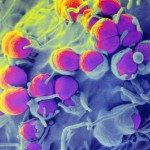Link to Pubmed [PMID] – 10536304
FEMS Immunol. Med. Microbiol. 1999 Nov;26(2):167-73
Bordetella pertussis adenylate cyclase toxin (ACT) is one of the few known protein toxins penetrating directly into the cytosol of target cells across their cytoplasmic membrane without the need for endocytosis. This capacity of ACT was recently exploited for in vivo delivery of single viral CD8(+) T-epitopes into MHC class I-presenting cells and induction of protective antiviral cytotoxic T-cell (CTL) responses. Here, we have explored the potential of the cell-invasive adenylate cyclase domain of the toxin to deliver larger antigens by evaluating the epitope-specific CTL responses induced by constructs bearing one to four copies of the CD8(+) T-epitope from the nucleoprotein of the lymphocytic choriomeningitis virus. The increase in the number of copies of the epitope was accompanied by a moderate decrease of the specific cell invasiveness of the ACT protein and did not lead to further enhancement of the level of induced epitope-specific CTL cells in mice, as compared to ACT with a single copy of the epitope. These results demonstrate the capacity of ACT to deliver larger heterologous antigens comprising several epitopes for antigenic presentation in vivo.
